Philly Schools React to Eagles Super Bowl Triumph

Philadelphia Eagles fans around the world rejoiced last night, taking home the first Super Bowl victory in the history of the organization. A handful of Philly business schools also joined in the jubilation after the upset of the New England Patriots, sharing a round of joyous reactions.
Drexel University and the LeBow College of Business was among the first to share their reaction to the Eagles victory, posting a celebratory video from University president John Fry.
On behalf of #Drexel Dragons everywhere, congratulations to our Super Bowl Champion Philadelphia @Eagles! #SBLII #SB52 #SuperBowlChampions #flyeaglesfly pic.twitter.com/VLtQkxezgn
— Drexel University (@DrexelUniv) February 5, 2018
Temple University and the Fox School of Business were a bit less formal in their congratulatory Eagles reaction, posting the following.
“True leadership is about action.” #FlyEaglesFly https://t.co/NSip55sAE6
— Fox School (@foxschool) February 5, 2018
Hey @Eagles,
That was fly. #FlyEaglesFly— Temple University (@TempleUniv) February 5, 2018
The West Chester Philadelphia campus took things a bit further, lighting up its buildings in heavy Eagles green.
WCU’s Philadelphia campus showing just a tad 😉 of Philadelphia @Eagles pride #flyeaglesfly #superbowlchamps #ramsup #wcuphilly pic.twitter.com/QsXFeio5Gr
— West Chester U (@WCUofPA) February 5, 2018
Villanova Business went a bit of a different direction, with students Michelle Maduras (’19 VSB) and Kriya Amin (’19 VSB) review the night’s ads in a live feed. Some of their favorites from Sunday night came from Mountain Dew, Doritos, and, of course, the New York Giants’ Dirty Dancing inspired tribute.
That's all from us! Thanks for following our SuperBowl takeover, and congratulations to the @Eagles, #FlyEagelsFly!!! pic.twitter.com/54q7KeFNee
— Villanova Business (@VU_Business) February 5, 2018
Out of Chicago, experts from the Northwestern Kellogg School of Management revealed their thoughts on the Super Bowl 52 ads, which you can check out over at Clear Admit.
Caught: Why Business Schools Might Lie to Improve Rankings

School rankings from sites like Forbes or U.S. News & World Report are often a crucial factor for students before they decide where they should pursue a degree. Using a combination of rankings, standardized test scores, job placement after graduation, and tuition costs, among other crucial factors, a school ranking a quick and succinct look at the relative merits and weaknesses of MBA programs throughout the country—and the world.
There is a lot riding on these rankings: not only do perspective MBAs often make decisions about where to pursue their degree based on these reviews, but graduates can use these rankings to demonstrate the quality of their degree to future employers. With such high stakes, organizations like U.S. News that compile these rankings rely on the accurate reporting of data from each business school.
So, what happens if the information is inaccurate, or worse? Data like student satisfaction and post-graduate salary—which can be so crucial in informing a prospective MBAs choice of school or program—is reported directly from the business schools, which often presents a conflict of interest potential. With so much at stake, would a school ever lie to increase their spot in the ranking?
Unfortunately, it seems the answer is yes. Just last week, the Online MBA program at Temple University’s Fox School of Business—a program that was consistently ranked in the top spot in U.S. News’ Online MBA ranking—vanished from the list. According to the initial announcement, new information had revealed that just 20 percent of Fox students in the Online MBA program had actually submitted test scores, a number that had initially been reported at a perfect 100 percent. Since the formula used by U.S. News weighs test score averages more if over 75 percent of students have submitted them, this inaccurate reporting from Temple Fox would have given the program an undeserved boost in the school ranking.
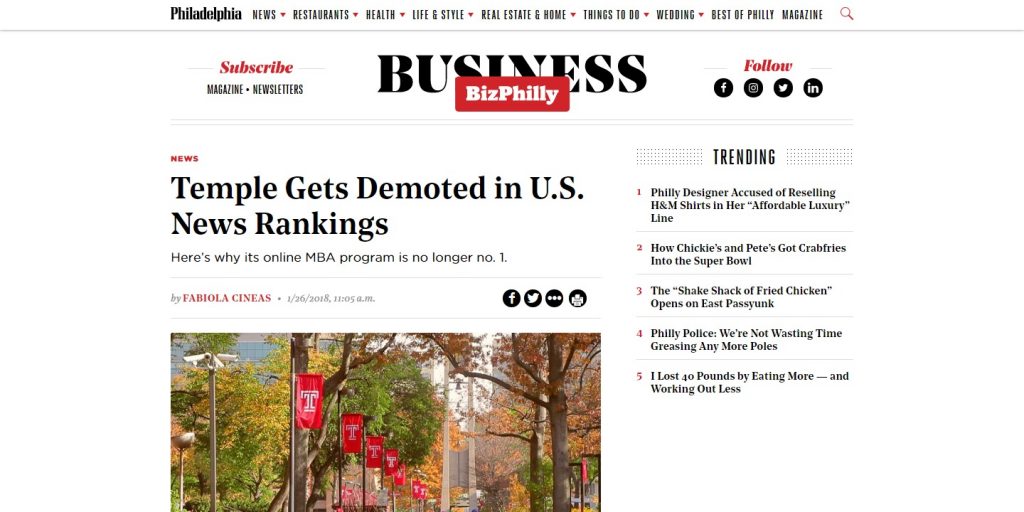
In the wake of Temple’s removal, questions continue to arise about the lengths schools go for good rankings/Photo via PhillyMag.
In the days since the initial announcement of Temple’s removal from the ranking, even more questions came out regarding the accuracy of Fox’s data. Further investigation found that Temple had reported 100 percent of students taking standardized admissions test for every year since 2014—a suspicious jump from the 25 and 33 percent that had been reported in the years prior. Since the test scores data submitted turned out to be inaccurate, it seems wholly possible that the data had also been misreported for the three years prior; the same years that Temple Fox held the top ranking for Online MBA programs.
This isn’t the first time it’s been discovered that business schools and even undergraduate programs have falsified or reported inaccurate data to boost its rankings. In 2013, Forbes was forced to remove four schools from its ranking of “America’s Best Colleges” due to inaccurate reporting: doctored SAT results from Bucknell University, false acceptance and graduation rates from Iona College, among others. In 2012, George Washington University lost its ranking on U.S. News’ “Best Colleges” list when it was discovered they were inflating the high school grades of their incoming students.
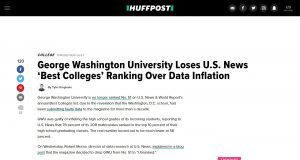
GWU was one of several schools in the past few years to submit false data for a rankings boost/via Huffington Post.
The problem may be even more far-reaching than some may suspect. In 2013, a survey of 576 college admissions officers found that 91 percent believed other colleges to be guilty of falsely reporting their admissions data. Even the school ranking creators themselves are shocked by this trend. In 2013, U.S. News editor Brian Kelly commented, “The integrity of data is important to everybody … I find it incredible to contemplate that institutions based on ethical behavior would be doing this.”
In 2005, the Association to Advance Collegiate School of Business (AACSB) took a deep look into this trend to examine why the issue of falsifying business school data might be so widespread. “Because rankings of full-time MBA programs are commonly presented under the label of ‘best b-schools,’ the public has developed a narrow definition about the breadth and value of business education,” the report states. Since most media rankings don’t consider factors like faculty research or doctoral education, MBA programs have become more likely to invest in more visible aspects of the program, such as facilities and marketing campaigns, which don’t actually deal with the quality of the degree. As a result, even high-quality programs may earn a lower media rank than they deserve based on the factors considered, adding pressure to do what it takes to earn a school ranking that matches what they perceive as the quality of the degree.
“Plenty of people apply to a school because it has reached the summit of a ‘best-of’ ranking, just as many people will see a movie or buy a book after it wins an award. That’s human nature,” Columbia Business School dean Glenn Hubbard told Fortune. “We want to experience the best.”
Whether or not placement in a school ranking truly represents the quality of a degree, it’s easy to see why the pressure is on for many admissions departments. A better school ranking can increase the number of applicants, providing for a more competitive, and diverse applicant pool, which creates a better quality admitted class. The cycle continues: success of these graduates can improve the possibility of future funding, providing more resources for the program and encouraging even more applicants to apply down the line.
“Rankings have become omnipresent in higher education, and they have enhanced the competition among institutions,” said Terry W. Hartle, senior vice president at the American Council on Education, in 2013. “And in any highly competitive environment, there is always a temptation to cut corners.”
For now, the Fox School of Business has been removed from the U.S. News Online MBA ranking. Concerns about false data continue to be evaluated, as organizations like AACSB continue to seek solutions and make recommendations for best practices when it comes to the collection and reporting of admissions data. In 2017, the AACSB publication “On Academic Rankings, Unacceptable Methods, and the Social Obligations of Business Schools,” suggested that schools and organizing bodies work together to find a method of data collection that includes “transparency, interpretability, and the empowerment of individual decision makers by whatever criteria truly suits their individual needs.”
For prospective students, its important to acknowledge this troubling but widespread trend as they make important decisions about where to earn a degree. While school ranking remains an easy way to compare programs against each other, students should consider not just the accuracy of the data but also the kind of factors reported in media rankings. While it seems possible that the number one program in a media ranking may not truly deserve that position, the real top program- the best for each individual’s needs and career goals—will always deserve first place.
Use These Key MBA Networking Strategies Before and After Graduation

In a competitive job market, current MBA students and recent graduates need to figure out how to stand out among their peers and make themselves attractive to potential employers. One of the most fundamental ways MBAs can maximize employment prospects, is to improve their networking skills.
Networking may be more than just a good employment strategy—it is actually a vital tool. According to Mark Brostoff, Assistant Dean and Director of Graduate Career Services at USC Marshall, “A successful job search begins and ends with successful networking. Networking should be one of the primary job search tools when pursuing a career,” he told MetroMBA.
With the advent of social media, networking is now an everyday part of our lives. Your internet presence is now a huge part of your job search. Brostoff highlights the unique value of maintaining the right kind of web profile: “Networking these days are [sic] both personal, as well as online, so maintaining a professional online appearance is extremely important before, during and after graduation.” Always keep in mind that while social media is a great way to communicate with friends and family, your online accounts are also a way of presenting yourself to potential employers.
The idea of MBA networking strategies may seem mystifying at first but as Terra Saltzman-Baker, the Director of Career Connections at UCSD’s Rady School of Management, assures, the idea is more ingrained within us than it may seem. “Quite simply, it means connecting with people. The more people that know you’re looking for a new job, or are changing your career focus, the more those around you may be able to assist.”
Successful MBA networking strategies are not only about reaching out to employers. An equally important move, and the first step in the process, is to inform those around you about career plans and ambitions. You never know how those in your social circle may be able to connect you to your ideal job. As Saltzman-Baker puts it, “it’s not just about the person you’re talking with, but those in their circle that they may think to connect you to.”
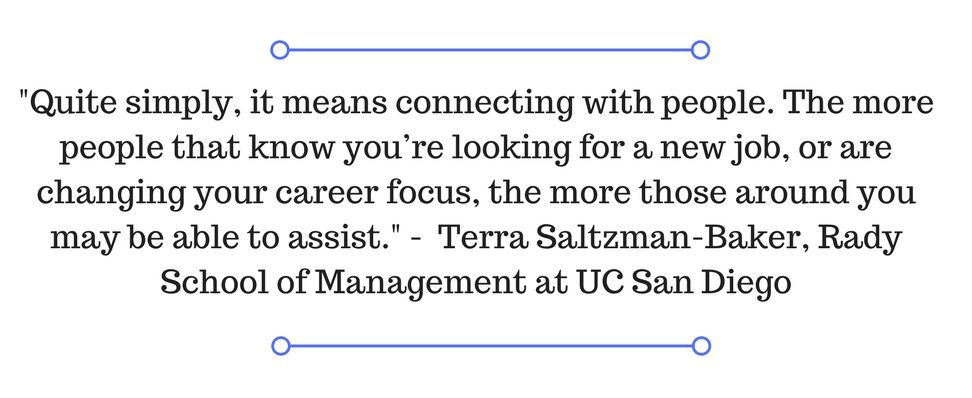
While it is a sensible move to use all of the online tools at your disposal, remember not to rely solely on the online communication that those platforms provide. Networking is all about building real relationships with others. At the heart of networking means valuing the quality of connections over quantity. Furthermore, connecting with others is not about simply finding those who can help you in your job search. Rather, the best networks benefit everyone involved. “Never mistake activity for progress,” says Dr. Janis Moore Campbell, Ph.D., the Director of Graduate Professional Development at Temple’s Fox School of Business.
“The best networking happens when people gather to learn from one another or to help one another,” she continues.
Stephanie Johnson, the Director of MBA/MS Career Services at Drexel University’s LeBow College of Business, also stresses that both parties must work together in order for the relationship to have any value. “Remember that networking is a reciprocal relationship, whenever possible, build mutually useful relationships where you aim to give before you expect something in return. In other words: “those who have given also receive.”
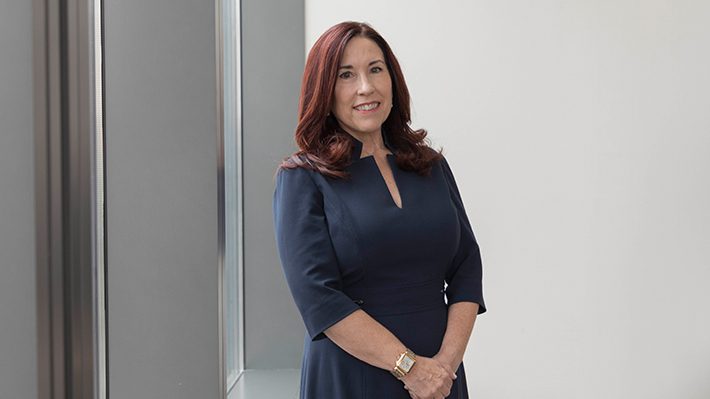
Stephanie Johnson, Director, MBA/MS Career Services – Photo via Drexel.edu
Perhaps one of the best MBA networking strategies is that it is never too early to start. The most successful networks are built before an MBA candidate begins their program, and then continue to evolve during and after school. Saltzman-Baker frames it simply: “The key is to start early. Don’t wait until you’re looking to make a change to use this strategy, but instead keep this up on a regular basis—you never know what may happen!”
BREAKING: U.S. News Removes Fox Temple From Online MBA Ranking

In some surprising news coming out of Philadelphia yesterday, the Temple University Fox School of Business Online MBA program—which had been named the best online offering in the country by U.S. News & World Report for the past four years—has been officially removed from the entire ranking due to misreporting admissions information.
According to Robert Morse and Eric Brooks, “the business school significantly overstated the number of new entrants for its 2016-2017 entering class who submitted GMAT scores. The misreported data resulted in the school’s numerical rank being higher than it otherwise would have been in the overall Best Online MBA Programs rankings and the Best Online MBA Programs for Veterans rankings.”
For the ranking, Fox Temple had originally reported that a remarkable 100 percent of applicants submitted GMAT scores for the survey. However, the school eventually informed the publication that only 50 out of 255 applicants actually submitted GMAT scores; less than 20 percent of the class.
Because of the infraction, the Fox School of Business will be completely removed from the 2018 ranking effective immediately. However, it will be eligible for re-entry on the 2019 ranking.
As of 4 p.m. EST, Fox Temple was still advertising its placement in the ranking on its main website.
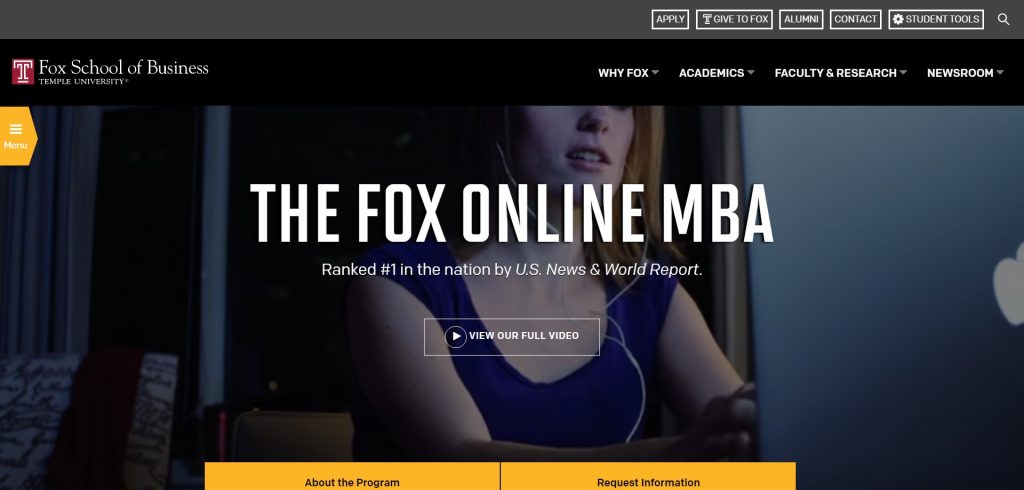
Earlier this afternoon, Temple released a statement regarding the change, which contained the following:
Once we discovered the error, we took the proactive approach to promptly self-report in order to correct a mistake. The data submitted overstated the number of incoming Fox Online MBA students who had provided GMAT and GRE scores as part of the enrollment process. It was our hope U.S. News & World Report would recalculate its rankings based upon the submission of revised data. However, we accept the U.S. News & World Report decision.
The Fox Online MBA program still embodies all of the qualities of the nation’s top program, regardless of the revised 2018 ranking. Our program has a long-standing reputation as one of the nation’s best online MBA programs.
We are doubling efforts to verify our data before it is submitted for rankings purposes, and we have every expectation that the Fox Online MBA program will return to its rightful place among the nation’s top programs of its kind in 2019 and beyond. Rankings are a byproduct of quality, and our focus will remain where it always has—on delivering high-quality programs and service to our students.
To ensure the integrity of the Fox School’s reported data and reporting, the University is hiring an outside, independent firm to review all of our school’s data reporting processes, including what happened in this instance, and to make appropriate recommendations. I have directed the entire Fox School to cooperate fully with this review.
Fox losing its spot at the top of the rankings is not unheard of. In 2012, George Washington University lost its spot in the U.S. News general university rankings. However, GWU, at the time, was ranked 51st overall. Temple, in this instance, is suffering a much greater penalty for submitting false information.
Stay tuned for more information on the story as it unfolds.
Comparing The U.S. News Full-Time and Online MBA Rankings

When it comes to business school rankings, U.S. News & World Report issues one of the most comprehensive annual lists. The annual rankings includes separate lists for the “Best Business Schools” and the “Best Online MBA Programs,” but deciding which format is right for you can still be tricky. Continue reading…
Choosing the Best MBA: Philadelphia vs. Washington DC

On the surface, cities like Philadelphia and Washington DC appear to have a lot in common. Both have occupied roles as a center of U.S. history, and have transformed into exciting and ever-changing metros for both established businesses and new startups. If you’re interested in earning an MBA in a top metro area on the East Coast, it might seem impossible to choose between the two.
Even so, Philadelphia and DC offer a number of exciting—but different—kinds of opportunities for up-and-coming business professionals. Between what program you want to pursue and what kind of career you envision yourself in down the line, understanding the differences between top metros can be a crucial part of planning your future. Below, we’ll break down some of the biggest differences in location, programs, and job placement for each metro.
Philadelphia vs. Washington DC: The Differences
For ambitious business students hoping to put their education to work in a government agency, it’ll be hard to beat the nation’s capital for opportunities and experience. Even for those looking outside of the government setting, the DC metro area is home to fifteen companies on the Fortune 500 list, including corporate giants like Exxon Mobile and Walmart. Yet while such heavy hitting companies in the area provide a high earning potential, MBAs will still want to consider the high price of living in DC: currently, the city ranks as the third most expensive place to live in the country.
Check This Out: Searching for the World’s Top MBA Recruiters: Comcast
While Philadelphia may not be the city that pops into your mind as a bustling center of business, research shows the City of Brotherly Love can’t be beat when considering the job market and affordability: a 2016 survey from Adobo found that Philadelphia’s unemployment rate was 20 basis points below the national average, while the average price of a home was at or below 30 percent of the average income. MBA graduates will find no shortage of business opportunities in the city, even among major firms: in 2017, 20 companies in the Philadelphia metro made the Fortune 500 list.
Washington DC’s Full-Time MBA Programs
Featuring more than 35 higher education institutions with post-bachelor business programs, Washington DC is home to some of the top MBA programs in the United States. Fully aware that many of these programs will shape future politicians and government leaders, many of the MBA programs in Washington DC include a focus on integrity and ethics within the global business community.
Full-Time MBA Programs in DC Include:
- George Mason University School of Business
- George Washington University School of Business
- Kogod School of Business – American University
- University of Maryland R.H. Smith School of Business
- McDonough School of Business – Georgetown University
Philadelphia’s Full-Time MBA Programs
When it comes to business schools, Philadelphia is probably best known for The Wharton School at the University of Pennsylvania, consistently named as one of the top business programs in the world. But Philly is also home to a wide range of programs with a variety of specializations. Programs like the full-time MBA at Temple University’s Fox School of Business also offer students to take their education beyond Philadelphia, with international campuses based in Italy, London, and Japan.
Full-Time MBA Programs in Philadelphia Include:
- La Salle University
- LeBow College of Business – Drexel University
- Villanova School of Business
- West Chester University
Cost of MBA Programs
Just as important a factor as cost of living, average cost for an MBA program is an important consideration when choosing where to earn your degree. As expected, top programs in both Philadelphia and Washington DC can come with a high price tag. The average cost estimate for one year at Wharton is $105,265, while tuition at DC’s Georgetown McDonough School of Business is $90,591. The average for each city, however, remains much for affordable: approximately $82,090 for programs in Washington DC, and slightly lower in Philadelphia—schools like West Chester even offer an MBA as low as $21,000 per year.
Job Placement and Salary
With so many incredible companies located in both Washington DC and Philadelphia, MBAs have the chance to earn top salaries that can go a long way in both cities. Depending on the position, MBAs in Philadelphia can make anywhere from $64,665 per year (as a financial analyst) to $104,186 per year (as a senior product manager). In Washington DC, the average salary for an MBA graduate is in the $80,000 range, with employees reporting yearly salaries of $74,758 (operations manager) up to $111,983 (marketing director).
